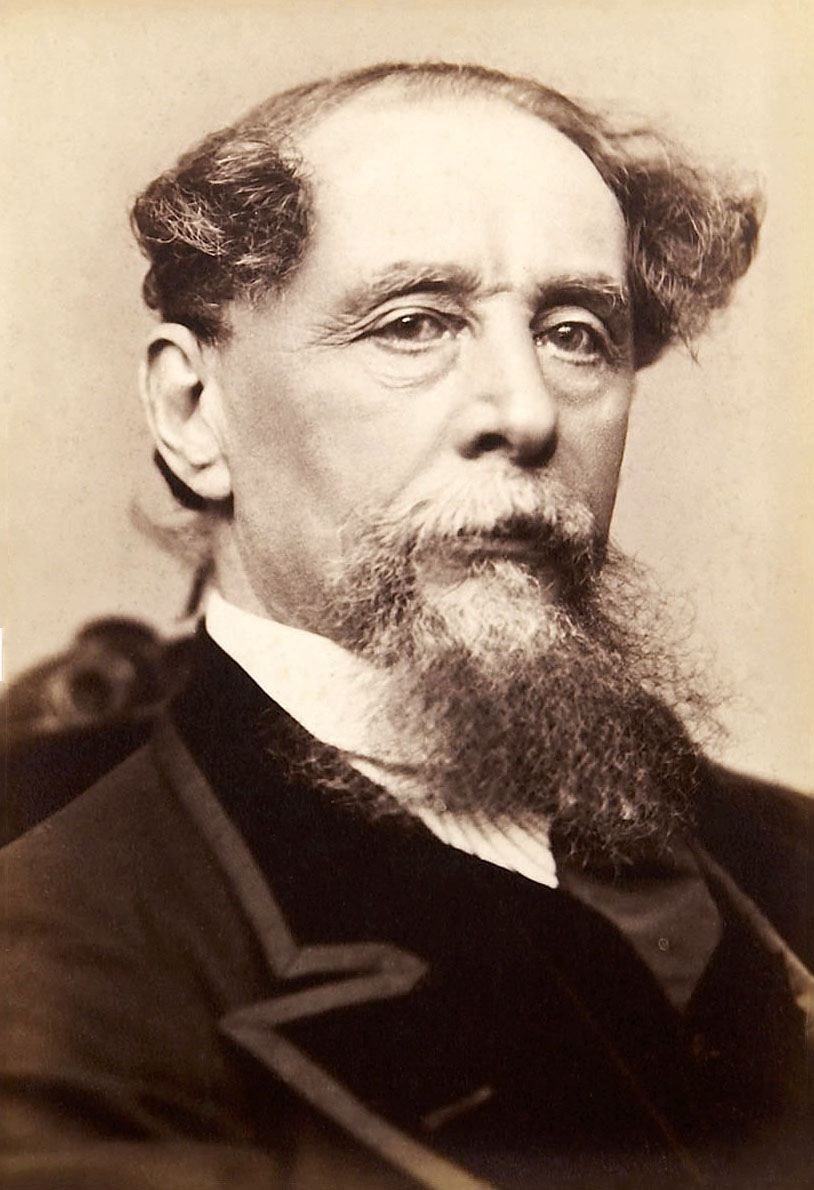Charles Dickens Frases famosas
“Um homem nunca sabe aquilo de que é capaz até que o tenta fazer.”
Variante: O homem nunca sabe do que é capaz, até que o tenta.
Citações de homens de Charles Dickens
“Cada fracasso ensina ao homem algo que necessitava aprender.”
Every failure teaches a man something, if he will learn
Little Dorrit - Vol. IV Página 284 http://books.google.com.br/books?id=JGUoAAAAYAAJ&pg=PA284, de Charles Dickens, Hablot Knight Browne - Publicado por B. Tauchnitz, 1857
Variante: Eu sempre pensei em Natal como um tempo bom; um bem, perdão, generosidade, época agradável; uma época em que os homens e mulheres parecem abrir seus corações espontaneamente. Deus abençoe o Natal!
Frases sobre o coração de Charles Dickens
“Há cordas […] no coração que melhor seria não fazê-las vibrar.”
There are strings [...] in the human heart that had better not be vibrated.
Barnaby Rudge - Página 99 http://books.google.com.br/books?id=LWUOAAAAQAAJ&pg=PA99, de Charles Dickens - Publicado por T.B. Peterson, 1842 - 315 páginas
“Eu honrarei o Natal em meu coração, e tentarei manter o ano todo.”
Variante: Eu honrarei o Natal em meu coração, e tentarei mantê-lo o ano todo.
Charles Dickens frases e citações
The whole difference between construction and creation is exactly this: that a thing constructed can only be loved after it is constructed; but a thing created is loved before it exists
The Posthumous Papers of the Pickwick Club - Página viii, de Charles Dickens - Publicado por Dent, 1931 - 804 páginas
“Aquele que alivia o fardo do mundo para o outro não é inútil neste mundo.”
No one is useless in this world [...] who lightens the burden of it for any one else.
Our Mutual Friend: In Two Volumes - Página 77 http://books.google.com.br/books?id=CB8LAAAAYAAJ&pg=RA2-PA77, de Charles Dickens, Marcus Stone, Chapman and Hall - Publicado por Chapman and Hall, 1865
Annual income twenty pounds, annual expenditure nineteen nineteen six, result happiness. Annual income twenty pounds, annual expenditure twenty pounds ought and six, result misery
Fonte: Charles Dickens, no livro "David Copperfield" (1849–1850), Chapter XII (veja wikisource)
The great commander, who seemed by expression of his visage to be always on the look-out for something in the extremest distance, and to have no ocular knowledge of anything within ten miles.
Dombey and Son - Chapter XXIV Página 351 http://books.google.com.br/books?id=qZIRAAAAYAAJ&pg=PA351, de Charles Dickens - 1859
“Nunca nos devemos envergonhar das nossas lágrimas.”
Variante: Nunca devemos envergonharmo-nos das nossas próprias lágrimas.
Fog everywhere. Fog up the river, where it flows among green aits and meadows ; fog down the river, where it rolls deified among the tiers of shipping and the waterside pollutions of a great (and dirty) city.
Bleak House - Página 3 http://books.google.com.br/books?id=kuenT7uXfagC&pg=PA3, de Charles Dickens, G. K. Chesterton - Publicado por Forgotten Books, 1953 ISBN 1606208853, 9781606208854 - 595 páginas
It was the best of times it was the worst of times, it was the age of wisdom it was the age of foolishness, it was the epoch of belief it was the epoch of incredulity, it was the season of light it was the season of darkness, it was the spring of hope it was the winter of despair, we had
A Tale of Two Cities (1859), Book the First, Chapter I
“Qualquer pessoa é capaz de ficar alegre e de bom humor quando está bem-vestida.”
Any man may be in good spirits and good temper when he's well drest.
Life and Adventures of Martin Chuzzlewit, Vol. I ~ Paperbound - Página 82 http://books.google.com.br/books?id=GNw4w5-qKGYC&pg=PA82, de Dickens, Charles - Publicado por Classic Books Company ISBN 0742696642, 9780742696648 574 páginas
“A dignidade de seu cargo nunca é prejudicada pela ausência de esforços de sua parte para mantê-lo.”
Charles Dickens: Frases em inglês
“…vices are sometimes only virtues carried to excess!”
Fonte: Dombey and Son (1846-1848), Ch. 48
“Pip, dear old chap, life is made of ever so many partings welded together…”
Fonte: Great Expectations (1860-1861), Ch. 27
“It is said that the children of the very poor are not brought up, but dragged up.”
Fonte: Bleak House (1852-1853), Ch. 6
Our Parish, Ch. 5 : The Broker’s Man
Sketches by Boz (1836-1837)
“Money and goods are certainly the best of references.”
Bk. I, Ch. 4
Our Mutual Friend (1864-1865)
“I don't care whether I am a Minx or a Sphinx.”
Bk. II, Ch. 8
Our Mutual Friend (1864-1865)
“The bearings of this observation lays in the application on it.”
Fonte: Dombey and Son (1846-1848), Ch. 23
“My guiding star always is, Get hold of portable property.”
Fonte: Great Expectations (1860-1861), Ch. 24
Our Parish, Ch. 5 : The Broker’s Man
Sketches by Boz (1836-1837)
"Administrative Reform" (June 27, 1855) Theatre Royal, Drury Lane Speeches Literary and Social by Charles Dickens https://books.google.com/books?id=bT5WAAAAcAAJ (1870) pp. 133-134
“That's the state to live and die in!…R-r-rich!”
Bk. III, Ch. 5
Our Mutual Friend (1864-1865)
Letter to Thomas Beard (11 January 1835), in Madeline House, et al., The Letters of Charles Dickens (1965), p. 53
“In love of home, the love of country has its rise.”
Fonte: The Old Curiosity Shop (1841), Ch. 38
in a private letter to Baronness Burdett-Coutts on 4 October 1857
“Resisting the slow touch of a frozen finger tracing out my spine.”
The Signal-Man http://www.charles-dickens.org/three-ghost-stories-the-signal-man/ebook-page-04.asp (1866)
“There is a wisdom of the Head, and … there is a wisdom of the Heart.”
Bk. III, Ch. 1
Hard Times (1854)
